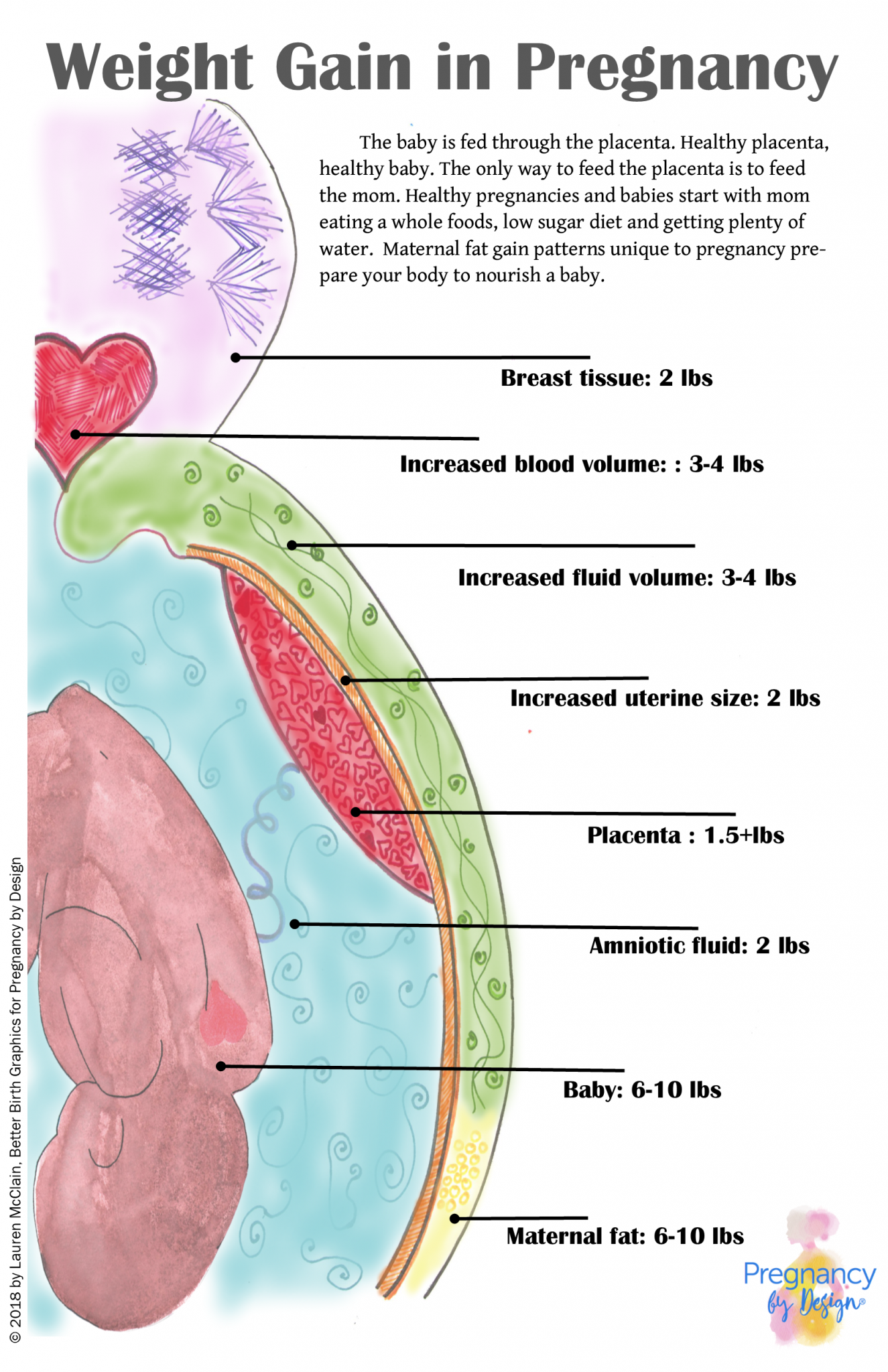Weight Gain in Pregnancy
How much weight to gain in pregnancy? Recommended amounts of weight gain in pregnancy can be a touchy topic—just like weight gain in general. There’s no universal recommendation for ideal weight gain because what’s best for you and your baby will depend on many variables. It is not common for women to gain only a few pounds during pregnancy. To grow a healthy baby you most likely will put on some extra pounds, perhaps even 15 to 25 pounds.
Your Ideal Recommended Weight Gain in Pregnancy Should Factor in:
- Pre-pregnancy weight
- Quality of your diet pre-pregnancy
- Quality of your diet in pregnancy
- Your general body size and stature
- Size of your baby and placenta
- Ethnic background
- Number of previous pregnancies
For years, US obstetricians warned women against gaining more than 15 or so pounds. Now we know that healthy pregnancy involves considerably more weight gain.
What’s most important is how you are gaining weight. If you get most of your calories from junk food, the weight you are gaining is mostly extra junk weight. Some providers stress nutrition above weight gain. Eating healthy in pregnancy is very important. Here is another weight gain guideline:
The Institute of Medicine (IOM) guidelines for weight gain in pregnancy (1) are based on studies that show gaining too little or too much weight can have unintended negative consequences.
When Should I Gain the Weight?
In the first trimester, there is generally no extra caloric need and weight gain is slow. You may also be feeling nausea or be throwing up, so this limits your ability to get calories. After the first trimester, the average weight gain for pregnant women is between .5 and 1 pound per week. In the beginning, this weight is going largely to your body systems to support the pregnancy. Toward the end of pregnancy, your baby grows faster.
- First trimester: 1-4.5 pounds
- Second trimester: 0.5 – 1 pound per week
- Third trimester: .5 -1 pounds per week
These are averages, and your healthy weight gain will depend on your individual pregnancy. For more personalized information visit the IOM’s Healthy Weight Gain Pregnancy calculator here. The IOM, in conjunction with the World Health Organization, affirms that caloric need in pregnancy is not that much higher and suggest:
A pregnant woman of normal weight, who gets less than 30 minutes of exercise a week should strive for a caloric intake of:
- 1,800 calories during the first trimester
- 2,200 calories during the second trimester
- 2,400 calories during the third trimester
Why do I Want to Eat All the Time?
The stereotype of pregnant women eating a lot of food or craving strange foods probably has a lot of causes.
Eating for two is a real thing. You need some extra calories just to grow a baby.
If you crave foods or feel that you can’t satisfy your appetite, it may be that you need nutrients you aren’t getting. Your body and baby are trying to do an incredible thing, and you need All The Nutrients, not junk food.
To some degree, your baby can leech vitamins and minerals from your own established body, but it works best when you are eating those nutrients and they can easily pass to the placenta. Plus, you really don’t want your baby taking all the calcium out of your bones.
If, for example, you are craving ice cream, perhaps you need more fats. Try getting more healthy fat in your diet.
If you just can’t seem to eat enough, consider eating more protein throughout the day, drinking more water, and varying what you eat to cover more nutritional profiles.
Your pregnant body is doing it’s best to help you and your baby thrive and will request more of what it needs. Try listening and following a whole foods, well-rounded diet with plenty of protein, good fats, vegetables, and whole grains. You can learn more about what is recommended what to eat when pregnant.
Where is All that Weight Gain In Pregnancy Going?
Don’t worry, it’s not all going to your thighs. Some fat gain is necessary for milk production postpartum, but there are plenty of other places your body gains as well.
- Your breasts become denser and larger by about 2 pounds.
- Your blood volume is increased by 50% and weighs about 3-4 pounds.
- You have increased fluid in your tissues, about 3-4 pounds worth.
- The pregnant uterus weighs about 2 pounds more.
- The baby’s placenta weighs at least 1.5 pounds.
- The water the baby swims in (amniotic fluid) weighs about 2 pounds.
- The baby itself weighs between 6-10 pounds.
- The maternal body fat you store for breastfeeding is between 6-10 pounds.

Am I Going to be Heavier After I Have the Baby?
Experiencing the changes in your body during pregnancy can bring up negative self-images. Our culture still idolizes thin women.
But a healthy pregnant body is not thin. Eat plenty of healthy foods and try to enjoy this precious time with your baby.
If you have concerns that bother you or interfere with your ability to eat and gain weight, consider seeing a therapist or talking with your birth provider to release your fear.
Your body needs specialized fat to feed the baby in your breast milk. About 5-8 pounds is the ideal average.
This fat goes into the breast milk and helps build your baby’s brain.
Many people find that this weight comes off while they breastfeed. Others lose it when they stop breastfeeding.
How Do I know I Gained the Right Amount of Weight?
The general guidelines above are a good place to start. Pregnancies and bodies are so individual, though, and the only way to know for sure is to see it through.
If you have a healthy pregnancy and delivery and your baby is healthy, clinically you gained a fine amount of weight. If, on top of that, you feel good and healthy after you’re all healed up, whatever you gained was ideal.
You should ask your Doctor, Midwife or Health care provider what is recommended for you and your health.
Does it Matter How Much I Weighed Pre-Pregnancy?
Yes, but also important is where you got that weight or lack of weight. If you are genetically thin and healthy, your ideal pregnancy weight gain will be different than if you were seriously restricting calories. If you are carrying a lot of extra weight, consider if that is stable and normal for you, or if it’s from stress and unhealthy eating practices.
Can I Lose Weight While Pregnant? Can I Diet During Pregnancy?
It’s possible, but not recommended. Even those who are clinically very overweight and obese are encouraged to gain some weight in pregnancy.
Low weight gain in pregnancy is associated with babies who are born too soon and too small to be healthy.
Everybody is different and you should ask your Doctor, Midwife or Healthcare provider what is recommended for you and your health.
Disclaimer: Pregnancy by Design’s information is not a substitute for professional medical advice or treatment. Always ask your healthcare provider about any health concerns you may have.
Cited Research:
- Institute of Medicine (Subcommittees on Nutritional Status and Weight Gain During Pregnancy and Dietary Intake and Nutrient Supplements During Pregnancy, Committee on Nutritional Status During Pregnancy and Lactation, Food and Nutrition Board) Nutrition During Pregnancy: Part I, Weight Gain; Part II, Nutrient Supplements.Washington, DC: National Academy Press; 1990.
- American College of Obstetricians and Gynecologists (ACOG). Weight Gain During Pregnancy: Number 548 (Reaffirmed 2020).


 6 Ways to Strengthen Your Relationship After Baby Arrives
6 Ways to Strengthen Your Relationship After Baby Arrives






Leave a Reply